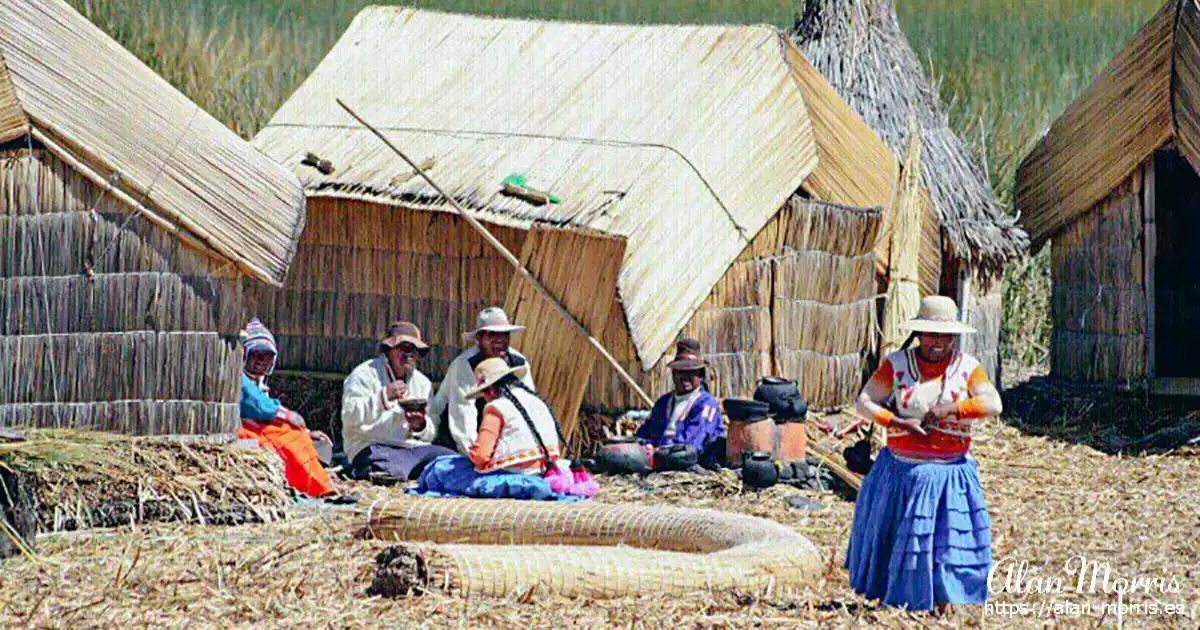After breakfast today, we left the hotel for the short drive through Puno to the pontoon, where a boat took us out onto Lake Titicaca.
Lake Titicaca.
Lake Titicaca is the largest lake in South America in terms of volume of water and surface area, and it's located in the Andes on the border of Peru and Bolivia. One of the most interesting aspects of Lake Titicaca is its cultural significance. The lake is home to several indigenous communities, including the Uros people, who live on floating islands made of reeds. These islands are a unique and remarkable example of human ingenuity and adaptation. I visited Lake Titicaca and the Uros Islands and stayed next to the lake overnight.
We passed through many small islands as we sailed over Lake Titicaca, each home to 8 to 15 people. As we pulled alongside one island, a party of the Uro women living on the island greeted us with a song and helped us board the reed island. They made me think of the welcome the women of Hawaii give visitors.
The first thing I noticed was how unstable I felt. I could sense the island beneath my feet moving, and my mind kept telling me that it was a reed island that wouldn't take my weight. Bracing myself against my imminent plunge through the reeds into the water below, I made my way to a circle of reed benches in the middle of the small island. We all sat down and watched and listened to the ladies here as they described how the island was made and how they lived.
We watched and listened to a demonstration of how the reed islands and building blocks were constructed. We were told that the reeds were used for lots more than making the islands. The base of the white reed is also employed as a food item, and because of its chemical makeup, it cleans people's teeth simultaneously. If this stuff were available in America, the dentists would go broke as the beautiful smiles that the people here have naturally would cost thousands of dollars there.
We were invited to look around the island and the buildings. Power there was supplied by solar panels mounted on the reed buildings. I found this fascinating and find myself wishing more people would use this form of energy. Then, as we look inside a reed-built house, we are amazed to see a large television and satellite dish. The satellite dish mounted on the side of the reed building gave people here access to hundreds of channels of the same daytime rubbish we in the UK are forced to endure. My idyllic notion of these people living without outside influence was immediately shattered. I hope it does not ruin their way of life.
After a look around the island, we were taken aboard a double-hulled reed boat to ferry us to another island. Two girls from the island we were on climbed aboard and rowed us to the next island, where we were to view a school. As we climbed onto the next island, I turned round to take a photo of the boat we arrived on. The two girls rowed out a few yards into the lake, where a motorboat came up behind it and then pushed it back to where it had come from. I wondered why, after all, it was a lot lighter now the 29 passengers had gotten off. You can't get the staff these days.
We went into the nursery school on the island, where we met a woman who had spent time at university and was unable to get work as she was considered a second-class citizen because she was an Indian from the floating islands. Because of this, she set up a nursery school for the children of the islands. She introduced us to her class, who sang a few songs for us, and they were delighted when we blessed them with our rendition of 'She'll be Coming round the Mountain'.
After visiting the school building, we took a slow ride back through the islands to Puno. There are lots of birds flying overhead and swimming in the water. The sun was shining, the birds were singing, and it was a beautiful day.
On returning to Puno, many of the people on the tour walked into town for a look around, but walking on the shifting reed beds made my ankle swell up, so I returned with the coach to our hotel and had lunch and a beer before resting my leg for a few hours.
